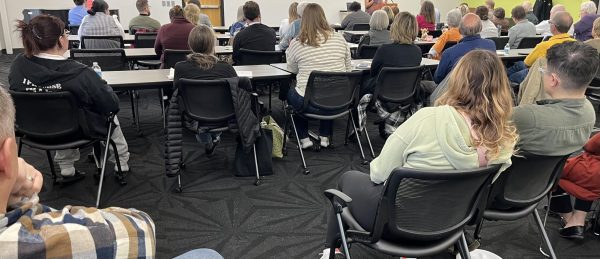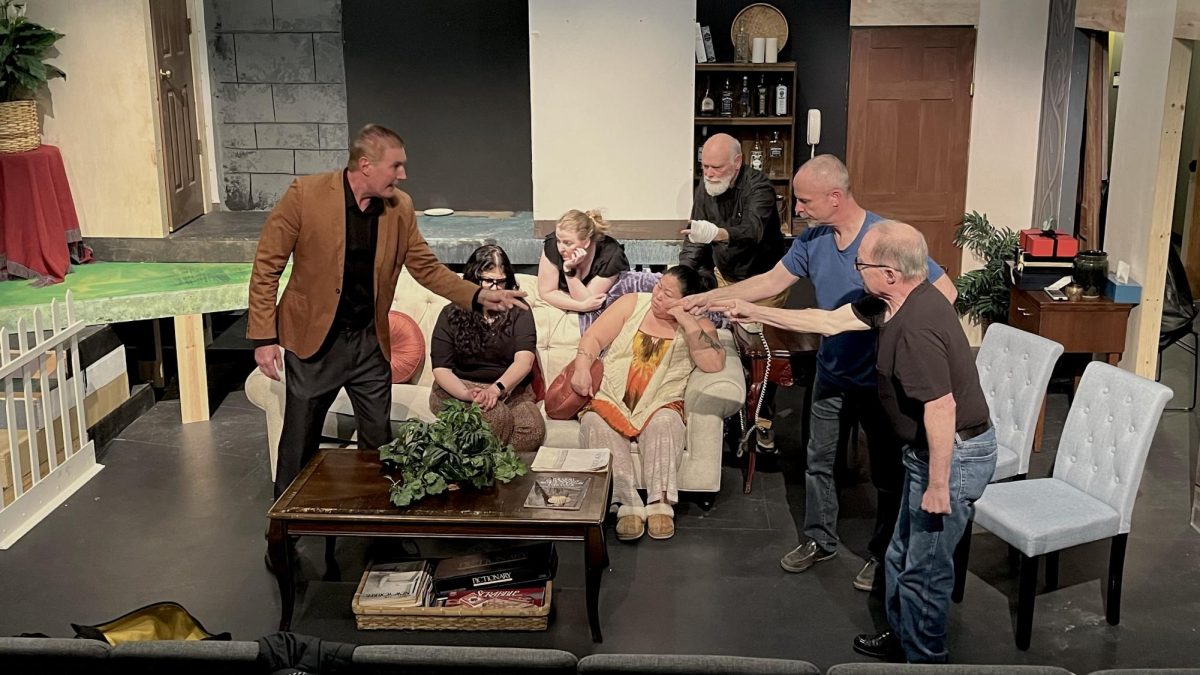Local immigration advocacy organization Immigrant Allies of Marshalltown is coordinating with organizations across Iowa to respond to immigration policy changes under the Trump administration and provide support for immigrants.
Joyce Ceballos `25, who has interned with Immigrant Allies for two years, said that a major change that Immigrant Allies has made is working with the Iowa Migrant Movement for Justice to promote and support a 24/7 hotline for people to report immigration concerns, such as local sightings of Immigrations and Customs Enforcement (ICE).
“The goal of it is not only to maintain safety for everyone, but also in times like these, what’s most important is that we try to help maintain people’s peace and calmness,” Ceballos said. “I take shifts that work with my schedule and answer those calls.”
Joa LaVille, a youth services supervisor at the Marshalltown Public Library and member of the Immigrant Allies steering committee, is helping to coordinate the Marshalltown County Community Response Coalition, which aims to provide reliable resources and information. The Coalition is formed by Immigrant Allies and Child, Adolescent, and Parent Support (CAPS).
“The main thing that we’ve been focused on … has been on our community members and making sure that they feel connected and that they think about things that are in their control, and not panic and not live in a state of toxic fear,” said La Ville. “We’ve seen an enormous amount of fear and uncertainty. Part of that has been the rapidity with which the changes have unfolded.”
Immigrant Allies has also been holding Know Your Rights workshops, emergency planning sessions where people can notarize legal forms and meetings for allies outside of the immigrant community to discuss how to support immigrants.

“We’re definitely not going to speculate about things that haven’t happened yet, but we do know the Know Your Rights information — the rights that everyone has under the Constitution, regardless of status,” La Ville said. “We can share that kind of information, and we can also share emergency planning for, if some of these really bad things do happen, what’s going to be the best that you can do to be ready to mitigate the severe impact that it will have on your family.”
Ceballos and LaVille said that a central worry from immigrant parents is the welfare of their children.
“A lot of times we’ll find the parents might be undocumented but their children are U.S. citizens, and so we’ve tried to be very proactive about this, because one of the main concerns that we’re heard is, ‘What am I going to do if tomorrow I’m gone and there’s no one to pick up my kid?’” said Ceballos.
“I’m worried about the toxic stress this is having on youth and teenagers that feel betrayed by the only country they’ve ever known,” LaVille said. “I don’t think that young children should have to be talked to about what to do if ICE comes to their door. I think that just even having to have those conversations is extremely traumatic, worrying about if your parent is out and about and is late or something, worrying that that means that they’re not coming home ever.”
In addition to adding emergency resources on their website, Immigrant Allies has been encouraging people to designate temporary legal guardians for their children in case of detention or deportation, as well as to update their children’s passports. The organization is also discussing policy changes with the Marshalltown school district, along with communicating these changes to non-English speakers.
“The school district has made a public statement that they will not be sharing any sort of information with any law enforcement unless they have a warrant or a legal document,” Ceballos said. “They’ve really tried to emphasize that they’re doing everything in their hands to keep the students safe. This is something that churches are doing as well — being intentional about what spaces are labeled as public vs. private, as that plays a role in what ICE could actually do.”
As an intern, Ceballos does a variety of work, including translating for Spanish-speaking families, serving as a liaison between immigration organizations and clients, helping coordinate legal clinics, and hosting cultural events.
“It’s been one of the greatest things I have done on campus,” Ceballos said. “It truly helps me connect with my culture, and it helped me feel at home. Marshalltown’s really diverse. There’s a large Latinx community there. And I remember prior to interning there, my first two years at Grinnell were a bit isolating, especially since I was coming from El Paso, which is, 80% of the population is Hispanic.”
Immigrant Allies has hosted community ID drives, which gives cards to individuals who may not have driver’s licenses to identify themselves with local law enforcement within their community.
“Something very unique in Marshalltown is that local law enforcement has really been supportive of the immigrant community in agreeing to partner with various organizations that made the community ID,” Ceballos said. “At least for the Mexican consulate, there’s just tons of calls, and it’s been really difficult to access them and save your ID from Mexico if it’s expired. The community ID is a great way to access some sort of identification, although it’s not provided by the state, that could still help you within your community.”
LaVille said that working with other organizations has helped Immigrant Allies — which is an all-volunteer organization that primarily refers people out to other resources — share reliable information.
“We try to disseminate information to the immigrant and refugee community, as well as kind of keep our finger on the pulse of what’s going on,” LaVille said. “We rely on state and national partners that are literally boots on the ground in D.C. or at the Iowa State House … watching for what’s happening.”
LaVille said that responding to statewide and national immigration policy changes has been especially difficult for advocates who are immigrants.
“Many of our advocates are allies from the native-born white community, but we also have many advocates and volunteers that are actually part of the immigrant community themselves,” LaVille said. “They’re both dealing with directly worrying about members of their own family, and they’re dealing with the additional weight of this huge responsibility of being relied upon.”
Ceballos said that she appreciates the tight-knit Marshalltown community. “The Marshalltown community is really strong, and there’s people all across backgrounds that want to help support the immigrant community,” she said.
Editor’s note: This article has been updated to reflect that the 24/7 hotline is a project of the Iowa Movement for Migrant Justice, not Immigrant Allies of Marshalltown. Updated April 1, 2025 at 10:39 p.m.


























































Joa LaVille • Apr 1, 2025 at 9:59 pm
Just a quick clarification—the hotline is a project of Iowa MMJ —the role of Immigrant Allies is more supportive through volunteer recruitment and sharing of the hotline, and our Coalition is a partnership with CAPS. It takes a village to do this work and we are very blessed to be a part of an awesome local and statewide network.